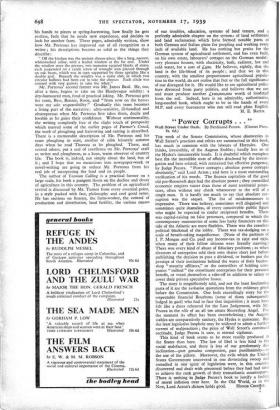" Power Corrupts . . . //
Wall Street Under Oath. By Ferdinand Pecora. (Cresset Press. 8s. 6d.) THE work of the Senate Commission, whose discoveries in Wall Street's practices and ethics are summarised in this book, has much in common with the labours of Hercules. One thinks, irresistibly, of the Augean Stables ; hardly less so of the Hydra's innumerable heads. It is doubtful which metaphor best fits the incredible state of affairs disclosed by the investi- gation and here related, with restrained but effective pungency, by Judge Pecora. " Power corrupts ; absolute power corrupts absolutely," said Lord Acton ; and here is a most outstanding verification of his words. The finance capitalists of the good old pre-Roosevelt days had the absolute power ; they controlled economic empires vaster than those of most territorial poten- tates, often without any check whatsoever to the will of a single man. It is hardly too much to say that absolute cor- ruption was the sequel. The list of misdemeanours is impressive. There was bribery, sometimes well disguised and sometimes quite shameless, of every conceivable public figure who might be expected to confer reciprocal benefits. There was capital-raising on false pretences, compared to which the contemporary manoeuvres of some less lucky financiers on this side of the Atlantic are mere fleabites. There was the ceaseless political blackmail of the lobby. There was tax-dodging on a scale of breath-taking magnificence. (None of the partners of J. P. Morgan and Co. paid any income-tax in 1931 and 1932, when many of their fellow citizens were literally starving.) There was every kind of abuse of fiduciary positions ; as when directors of enterprises sold their own shares short just before publishing the decision to pass a dividend, or bankers put the prestige of their institutions behind the wares of their bucket- shop " security affiliates," or the controllers of holding com- panies " milked " the constituent enterprises for their personal benefit, or voted themselves a rake-off in addition to salary to cover their private speculative losses.
The story is magnificently told, and not the least fascinating parts of it are the verbatim quotations from the evidence given before the Commission. One feels exceedingly sorry for the respectable financial Bourbons (some of them subsequently lodged in gaol) who had to face that inquisition ; it must have felt like a dress rehearsal for the Last Judgement, with Mr. Pecora in the role of an all too astute Recording Angel. For the moment its effect has been overwhelming ; the Augean stables are comparatively sanitary, the Hydra is quiescent. But the least legislative loophole may be widened to admit a further torrent of malpractices ; the price of Wall Street's continued rectitude, Judge Pecora is sure, is eternal vigilance.
This kind of book seems to be more readily produced in the States than here. The law of libel is less kind to the social malefactor, and there is less of our gentlemanly dis- inclination—part genuine compassion, part pusillanimity—to the use of the pillory. Moreover, the evils which the United States Government uncovered in one devastating swoop and remedied in one spate of legislation were, in this countrY, discovered and dealt with piecemeal before they had had time to achieve the rank growth of their transatlantic counterpart,. There is nothing in Judge Pecora's book to justify a feeling of moral inflation over here. In the Old World, as in the New, Lord Acton's dictum holds good. Hof.= CROTE.




































































 Previous page
Previous page